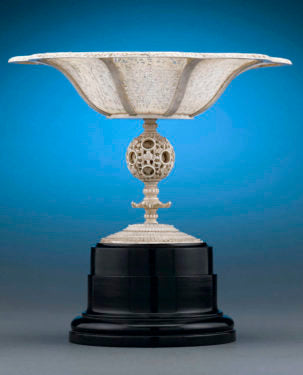If you were to hear the word “puzzle,” the first thing that would probably come to mind would be the countless jigsaw puzzles that you solved throughout your childhood. Puzzles, however, come in many shapes and sizes and serve various purposes aside from entertainment. One such variety, commonly known as the Chinese puzzle ball, is an incredible spherical enigma that has been incorporated into various forms of decorative art for centuries. Below, we will be diving into the world of Chinese puzzle balls so you can have a better understanding of these multi-purpose antique pieces.

Chinese carved ivory tazza with a puzzle ball stem, Circa 1820
Throughout history, the Chinese have been known for creating beautiful works of arts and crafts. The Chinese puzzle balls of the early 19th century are perhaps the most mysterious and nuanced crafts ever created. Even though these tiny treasures are not meant to be solved like a normal puzzle, they are called “puzzle balls” due to the mystery and puzzling explanation behind their making. Technically speaking, they can be solved by aligning each hole from each layer together; however, due to their fragility and delicate material it is recommended that they be used simply for decorative purposes.

Close up image of the puzzle ball on the Chinese tazza above
Chinese craftsmen paid much attention to detail when crafting these delicate masterpieces. Puzzle balls are typically made of ivory and have 3 to 7 layers of concentric, hollow spheres. Using a small “L”-shaped tool, the artist would start with a solid ball of ivory, jade, wood or any other ductile material and carefully drill his way through to the center of the object. He would then hand carve various holes within the sphere, working his way up, ultimately dividing the solid ball into many layers. This carving process required a great amount of time and of course, an incredibly steady hand.
The final result would be an ivory ball containing multiple layers of unique smaller spheres within. While each layer of the object would have its own unique design or symbols, the outermost shell showed the most extraordinary amount of craftsmanship and beauty while also telling a symbolic story. Loaded with important symbolism, charm, and craftsmanship, these puzzle balls were often used as good luck charms for Chinese royalty and nobles. A painstaking and costly process is required to create just one of these elaborately ornamented treasures; therefore, antique ivory puzzle balls are highly sought after by collectors today.

In this incredible chess set depicting George III vs. the Emperor of China, each piece rests upon a puzzle ball






